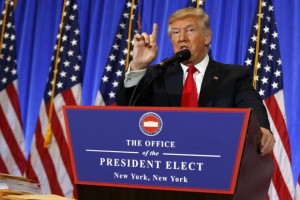Combative Trump concedes Russia’s role in election hacking

President-elect Donald Trump speaks during a news conference in the lobby of Trump Tower in New York, Wednesday, Jan. 11, 2017. (Photo by EVAN VUCCI/AP)
NEW YORK — President-elect Donald Trump’s first news conference since winning the election was a combative and freewheeling affair, and the famously unconventional politician demonstrated he had not been changed by the weight of his victory.
Trump said for the first time Wednesday he accepts that Russia was behind the election-year hacking of Democrats that roiled the White House race. Looking ahead, he urged Congress to move quickly to replace President Barack Obama’s signature health care law and insisted anew that Mexico will pay the cost of a border wall.
He defiantly denied reports that Russia had collected compromising personal and financial information about him, lambasting the media for peddling “fake news” and shouting down a journalist from CNN, which reported on the matter. His family and advisers clapped and cheered him on throughout.
Trump’s transition has been overshadowed by US intelligence assessments that Russia not only meddled in the election, but did so to help him defeat Democrat Hillary Clinton. After spending weeks challenging that idea, Trump finally accepted at least part of the intelligence conclusions.
“As far as hacking, I think it was Russia,” Trump said, quickly adding that “other countries and other people” also hack U.S. interests. Still, he kept needling the intelligence agencies, saying it would be a “tremendous blot” on their record if officials were leaking information from his classified briefings.
Article continues after this advertisementDirector of National Intelligence James Clapper said in a statement later that he had spoken with Trump Wednesday evening and told him he does not believe any leaks came from the intelligence community.
Article continues after this advertisementTrump has not said whether he believes Clapper’s claim about the source of the leaks. He tweeted Thursday: “James Clapper called me yesterday to denounce the false and fictitious report that was illegally circulated. Made up, phony facts. Too bad!”
One US official told The Associated Press Tuesday night that intelligence officials had informed Trump last week about an unsubstantiated report that Russia had compromising personal and financial information about him. The official was not allowed to publicly discuss the matter and spoke on condition of anonymity.
Some media outlets reported on the document, which contains unproven information alleging close coordination between Trump’s inner circle and Russians, as well as unverified claims about unusual sexual activities by Trump. The AP has not authenticated any of the claims.
Clapper said Wednesday he had told Trump the intelligence community “has not made any judgment that the information in this document is reliable.”
Wednesday’s news conference was initially billed as a chance for Trump to answer questions about his plans for distancing himself from his sprawling, family-owned real estate and licensing business. Lawyer Sheri Dillon stepped to the lectern midway through the event to announce that the president-elect was relinquishing control of the Trump Organization to his adult sons and an executive, as well as putting his business assets in a trust. While new international business deals will be banned, the company will be allowed to start new projects in the US.
The move appears to contradict a previous pledge by the president-elect. In a tweet last month, Trump said that “no new deals” would be done while he was in office.
The president-elect set some concrete policy markers Wednesday, though specifics continued to be in short supply on some of his major campaign promises.
He promised that a replacement for Obama’s sweeping health care overhaul would be offered “essentially simultaneously” with a congressional vote to repeal the measure. He said his team would send a plan to Congress after Rep. Tom Price, his pick to lead the Department of Health and Human Services, is confirmed.
Turning to his plans to build a wall along the nation’s southern border, Trump vowed that Mexico would “reimburse” the cost of the project through an unspecified tax or payment. He said that while his administration would begin negotiating with Mexico after his Jan. 20 inauguration, he did not want to delay the work until an agreement was reached, raising the prospect that US taxpayers could ultimately bear the costs. –Julie Pace
* * *
Associated Press writers Ken Thomas and Laurie Kellman in Washington and Jonathan Lemire in New York contributed to this report.